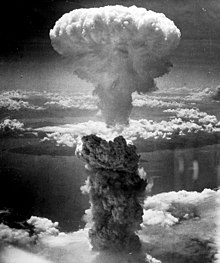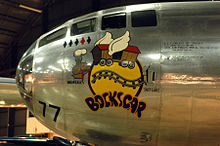Buckscar


Bockscar (or Bock's Car , named after its first pilot on the Mariana Island Tinian , Frederick C. Bock , alluding to the English term boxcar for a closed rail freight car) was a B-29 bomber of the 509th Composite Group of the United States Army Air Forces , who dropped the second US atomic bomb (“ Fat Man ”) ever used in a conflict on August 9, 1945 over the Japanese city of Nagasaki (→ atomic bombs dropped on Hiroshima and Nagasaki ).
The Bockscar was not flown by its regular crew, but by the crew of the B-29 bomber The Great Artiste . The crew was changed at the last minute before departure, as The Great Artiste was still equipped with the scientific equipment from the previous mission over Hiroshima with the Enola Gay and no conversion was wanted. So the crew flew Bockscar the The Great Artiste to the measurements to be performed, and the The Great Artiste , the Bockscar to throw off Fat Man. The machine with the serial number 44-27297 was built in the Glenn L. Martin Company's plant on Offutt Field near Bellevue (Nebraska) and equipped there with a special suspension for the comparatively high weight (around 5.4 t) of the atomic bomb.
The primary target Kokura was covered with clouds, so Charles Sweeney , commander of the Bockscar, decided to attack the secondary target Nagasaki. The bomb was supposed to be dropped over the shipyards, but it was dropped about two kilometers further over the Mitsubishi arms factory. It exploded in a valley, so the surrounding mountains dampened the impact on the city's surroundings.
The buckscar is on display in the USAF Museum at Wright-Patterson AFB in Dayton, Ohio. There it bears the markings of the 509th Composite Group (arrowhead forward), the bomber group to which all “atomic bombers” were assigned. During their war effort, the marks of the 444th Bomb Group (N in triangle) were applied to disguise the actual association membership .
Crew of the Bockscar during the operation of Nagasaki
| Major Charles Sweeney | pilot |
| First Lieutenant Charles Albury | Copilot |
| Captain James Van Pelt, Jr. | navigator |
| Captain Kermit Beahan | Bombardier |
| Lieutenant Jacob Beser | Operation of the radar range finder |
| Staff Sergeant Ed Buckly | |
| Sergeant Abe Spitzer | |
| Master Sergeant John Kuharek | Flight engineer |
| Sergeant Raymond Gallagher | Flight engineer assistant |
| Staff Sergeant Albert Dehart | Rear gunner |
| Commander Frederick Ashworth | Weapons officer |
| 2nd Lieutenant Fred Olivi | Third pilot |
Web links
- Boeing B-29 Superfortress "Bockscar" . In site of the National Museum of the United States Air Force (English)
- B-29 Superfortress "Bockscar" . In: B29-Superfortress.com (English)
Individual evidence
- ^ Steve Birdsall: Superfortress - The Boeing B-29 , p. 38, squadron / signal publications, 1980


